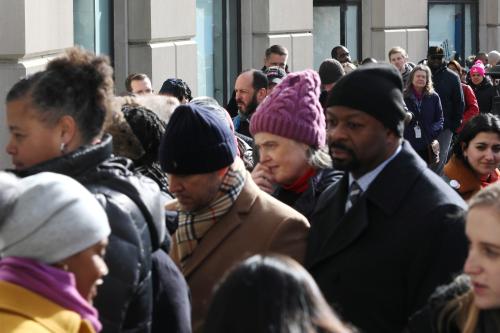This article originally appeared in Literary Review in the June 2019 issue.
It took liberals just two decades to turn from hubris to hand-wringing. When the Berlin Wall fell, their confidence was unbounded. The ‘End of History’ was declared. Liberalism had won. Today, with the rise of populism, liberals are walking around like clueless tourists, wondering how we ended up here and what to do about it.
Liberals forgot three fundamental facts about liberalism: a liberal society is a permanent work in progress; the work is hard; the lure of illiberalism is always strong. The forgetfulness of liberals led them to complacency and presumptuousness. Victims of their own short-term success, they failed to maintain the energy and passion necessary to fuel sustainable liberalism. The intellectual triumph of liberalism led to its political neutralisation.
Adam Gopnik accurately describes how the received view of liberals is as weak, unable even to take their own side in an argument. ‘There are no atheists in foxholes, and no liberals in bar fights,’ he writes. ‘In the middle of the bar fight, the liberal is writing a blog post about biodegradable bottles or, more likely, trying to start a tasting of artisanal bourbons.’ The liberal as weakling is one of the false impressions Gopnik sets out to correct. Another is of the liberal as a kind of lawyer, procedural and technocratic, writing ‘the rules on a board game box’.
Liberalism is in fact vivid, activist, questing. It is a moral movement to fashion a world for all of us, in our kaleidoscopic complexity, to live, love and learn in. Right now, liberals do not need a philosophy lecture. They need a rallying cry, and Gopnik gives us one.
History is a good place to start. We should remember that liberals have replaced hereditary systems of government with democracy, weakened vested interests in the economy, pioneered systems of welfare to protect individuals and diminished the reach of discrimination in all its guises. As Gopnik wryly puts it, ‘liberals get nothing accomplished – except everything, eventually.’
But liberal reforms do not occur overnight. Sweeping changes sound good, but they tend not to last – or worse, to lead to tyranny. Radicals on both the Left and the Right make chilling diagnoses of our collective health and offer large-scale, invasive treatments. Liberals typically offer a nuanced assessment of our condition and an incrementalist programme for its improvement. Yawn! But while liberals may not be revolutionaries, they are reformers – and they are usually right.
Progress comes through the collation of ideas and evidence, and the brokering of compromises. In making the case for progress in increments, Gopnik’s gift for coining phrases serves him well: ‘amendments are among the proper nouns of liberalism’; ‘for liberals coalition and compromise are fighting words, devices to battle by’; ‘social contacts precede the social contract’.
Gopnik’s aphoristic style will be familiar to New Yorker readers, as will some of the material here, since the book draws on essays he’s written for the magazine (including one based on my own book on John Stuart Mill). But there is plenty of new writing too, assembled in style. One of his leitmotifs is that liberalism is a practice rather than a theory. For Gopnik, liberalism is something we do rather than declare: ‘Liberalism … is an attempt to realize liberty, not merely invoke it or make it the subject of an incantation.’
The book opens with a description of Mill and his relationship with Harriet Taylor. For many, Mill personifies liberalism’s dry, technocratic nature. But while Mill might be remembered now principally as a thinker, he was also a parliamentarian, a polemicist and a campaigner. Jailed as a teenager for his activities, Mill was still stirring crowds in his dotage.
Gopnik’s approach is appropriately liberal. He sets out the anti-liberal arguments made by those on both the Left and the Right, and then answers them. ‘Being a liberal means being perpetually engaged in a two-front war,’ he observes. In a chapter entitled ‘Why the Right Hates Liberalism’, Gopnik summarises the conservative critique. Liberalism, it is claimed, corrodes the institutions – churches, families, nations – that provide stable authority and underpin not just orderly societies but also well-ordered lives. Sandblasting away these institutions, liberalism leaves people free but with their lives hollowed out: ‘achievement and Amazon shopping for the privileged; lifelong hopelessness and opioid death for the rest’.
This is, as Gopnik notes, a caricature. Conservatives who accuse liberals of ‘treating millennia-old beliefs as though they were as disposable as Kleenex’ need to talk to, or at least read, some actual liberals. Here’s Mill in On Liberty: ‘It would be absurd to pretend that people ought to live as if nothing whatever had been known in the world before they came into it; as if experience had as yet done nothing towards showing that one mode of existence, or of conduct, is preferable to another.’
Traditions survive for a reason, often a good one. But traditions are not exempt from critical scrutiny and revision. ‘Tradition is a very mixed bag of nice things and nasty things,’ Gopnik writes. The liberal goal is to ‘work together to fix the nasty ones while making the nice ones available to more people’. The pluralism baked into liberalism does make for friction and dissent. People who tend towards a minimalist style in their interior lives will always be made uncomfortable by the disarray of liberal societies. Like cooking with children, liberalism is a messy business.
But it is when discussing the left-wing critiques of liberalism that Gopnik is at his most robust. Radicals on the Left share with radicals on the Right a contempt for liberal incrementalism. But many left-wingers also see liberalism as a creed that springs from and sustains the privileges of old white men. With the simple addition of the prefix ‘neo’, liberalism provokes in such people something approaching an allergic reaction.
The Left’s turn towards ‘intersectionalism’ provides Gopnik with an opportunity to make the liberal case for individualism. It is true that people have identities shaped by a wide variety of categories, affiliations and commitments. You may be a black heterosexual Jewish socialist lawyer; I may be a white gay atheist libertarian coal miner. Liberals insist that the construction and reconstruction of these identities are up to each one of us. ‘Intersectionalism in a sense does not go far enough,’ Gopnik writes. ‘There are countless nodes on the network of social categories. We call each one a person.’ This is fine stuff indeed. Liberalism simply ‘intersects’ all the way down to the individual.
It seems churlish to find faults in this book. Those that occur are trivial and mostly come down to matters of taste. At various points, Gopnik addresses his arguments to his daughter, Olivia. But it is an episodic effort (she disappears for half the book) and an unnecessary one. Gopnik is not a writer who needs to rely on narrative contrivances.
On the timeline of human history, liberal societies are very recent achievements. Authoritarianism is the rule to which liberalism is the modern exception. The idea that liberal political systems are the norm is a dangerous illusion. ‘The lure of a closed authoritarian society is one permanently present in human affairs,’ Gopnik writes. ‘The real question is not what makes it happen but what, for brief periods of historical time, has kept it from happening.’ Liberty is not a gift, but a task. It’s a worthy one for sure, but a difficult one too. The question is whether we are still up to it.






Commentary
Op-edCry Freedom: Review of Adam Gopnik’s book ‘A Thousand Small Sanities’
June 12, 2019